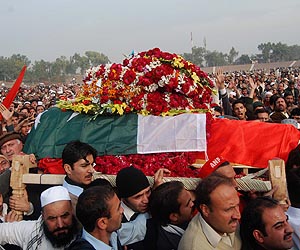This article was originally published in Dawn on November 13th , 2014
HALFWAY through the interview, Mian Iftikhar gets a phone call. He doesn’t recognise the number. Should he attend, he wonders out loud. It turns out to be someone from Khyber News, the Pashto TV channel. They want to know his views about a journalist, a staff member, who died recently. Of natural causes, we may add.
He speaks fondly, on air, about the services the man rendered in the field of journalism. He ends the call saying, “It’s no consolation but we are grateful to God that he died in peace of natural causes in a place where people routinely pick up body parts of their loved ones.”
The irony is cruel, the imagery unsettling. But Mian Iftikhar should know. As the general secretary of the Awami National Party (ANP) that has buried nearly a thousand of its activists, including leaders, killed in bombings or targeted killings, he spends more time these days offering condolences than attending to party matters.
And in between, he, a marked man high on the militant hit list, must every day contemplate his own chances of dying a natural or a violent death. Nothing in his bearing suggests this worry, of course — except that he takes care to go alone when he goes out, so no one else gets hurt when they come for him.
The long shadow of Swat
The wave of targeted killings aimed at the ANP in the wake of the Swat operation in 2009 has never quite receded. Over the last few months, it has escalated to an extent that is alarming even by the ANP’s own grim standards of losing leaders and activists to incessant hits. In Swat alone, according to Swat ANP president Sher Shah Khan, there have been 24 targeted killings of ANP workers in the past three months. Overall, 22 members of the Swat Amn Committee, that the ANP constitutes a big part of, have been killed since 2009.
“All through the Swat operation and beyond, our stance has been unequivocal: we are against terrorists, good or bad,” says Mian Iftikhar. “We stand for peace and we are being punished for that ideological stance. There is no resistance against militants in Mardan, Charsadda and Swabi. There are no Amn Committees there. They are targeting the Amn Committee in Swat for fear that if it succeeds against the militants, others will follow suit.”
When the ANP came to power in Khyber Pakhtunkhwa in 2008, says the party leadership, it inherited a Swat and Malakand from the Muttahida Majlis-i-Amal government that was virtually under the control of militants. Even though the ANP paid a bitter price, losing party stalwarts like Bashir Bilour and others to their anti-militancy stance, the government was able to clear the region of the Taliban.
Since 2013, when the Pakistan Tehreek-i-Insaf (PTI) came to power in Khyber Pakhtunkhwa, the militants have been resurgent in the valley. The ANP, and independent observers, attribute this resurgence to the ambivalent policies of the government, and the pro-Taliban stance of the PTI and the Jamaat-i-Islami in the provincial government.
“They want Imran [Khan], Nawaz [Sharif] and [Tahirul] Qadri that fit into their plans, not the ANP,” says a Swat-based ANP activist. “Not a single word was spoken about peace at the dharnas. While political gatherings go without any threat in Islamabad and Lahore, our corner meetings are targeted.”
Hit hard in Karachi
In Karachi, where the ANP has a strong following, party cadres have been hit hard by the TTP-Swat. Since elections in 2013, when the TTP declared war on the ANP, the Muttahida Qaumi Movement and the Pakistan People’s Party, asking voters to stay away from campaign meetings and polling, the ANP has lost candidates and elections to targeted attacks in neighbourhoods such as Lyari and SITE where it won in 2008.
According to Zia-ur-Rehman, a researcher based in Karachi, 70 ANP activists have been targeted in Karachi alone. “The party leadership has crossed over to right-wing parties like the JI, the Ahle Sunnat Wal Jamaat and the PTI to stay safe,” he says. “Others have gone back to their hometowns in Swat and Bajaur to escape attacks.”
Observers point out that behind the targeting of the ANP, the PPP and the MQM is the desire of militant groups to wrest control of Pakistan’s commercial capital.
Surviving the odds
Political and independent analysts suggest that for a party like the ANP to survive these dark times, it must shift the focus from the centre to the front line leadership in its rank and file. “They will need to reach out to the young workers that are still ardent despite the huge odds,” says a Peshawar-based party worker. “They will have to address corruption, do away with dynastic politics and build on the achievements made during their last government, such as education.”
While there are no immediate solutions to containing the threat, Khadim Hussain, a security analyst, suggests that party activists should stay away from Amn Committees. “The security forces and the state intelligence apparatus use them as sandbags for intelligence gathering, which makes them vulnerable,” he says.
“After military operations, the army should hand over security to the police. Policing should be improved because despite the PTI’s claims of having reformed the police force, they still allow militant sleeper cells, either for fear or because the provincial government is sympathetic towards them.”
Published in Dawn, November 13th , 2014













































